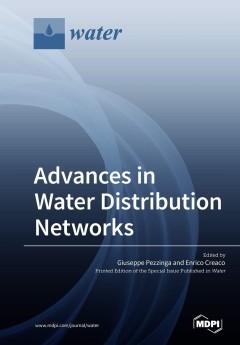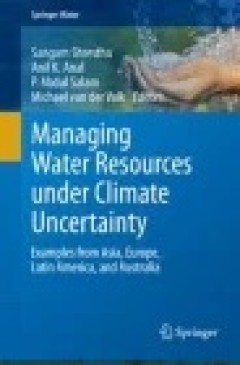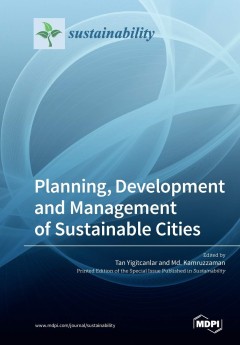Filter by

Advances in Water Distribution Networks
The Special Issue on Advances in Water Distribution Networks (WDNs) explores four important topics of research in the framework of WDNs, namely simulation and optimization modelling, topology and partitioning, water quality, and service effectiveness. With regard to the first topic, the following aspects are addressed: pressure-driven formulations, algorithms for the optimal location of control…
- Edition
- -
- ISBN/ISSN
- 978-3-03897-557-1
- Collation
- -
- Series Title
- -
- Call Number
- 628 ADV

Advances in Groundwater Flow and Solute Transport : Pushing the Hidden Boundary
In recent decades, the study of groundwater flow and solute transport has advanced into new territories that are beyond conventional theories, such as Darcy’s law and Fick’s law. The studied media have changed from permeable porous and fractured ones to much less permeable ones, such as clay and shale. The studied pore sizes have also changed from millimetres to micro-meters or even nano-me…
- Edition
- -
- ISBN/ISSN
- 978-3-03921-075-6
- Collation
- -
- Series Title
- -
- Call Number
- 628 ADV

Managing Water Resources under Climate Uncertainty: Examples from Asia, Europ…
This book aims to come up with views to address the queries of planners, policymakers, and general people for water resources management under uncertainty of climate change, including examples from Asia and Europe with successful adaptive measures to change the challenge of climate change into opportunities. The availability of clean water is a major global challenge for the future due to a rap…
- Edition
- -
- ISBN/ISSN
- 978-3-319-10467-6
- Collation
- -
- Series Title
- -
- Call Number
- -

Wind and Wildlife Proceedings from the Conference on Wind Energy and Wildlif…
This book gathers papers presented and discussions held at the Conference on Wind Energy and Wildlife Impacts in Melbourne, Australia on 9th October 2012. The purpose of the conference was to bring together researchers, industry, consultants, regulators and Non-Government Organizations to share the results of studies into wind farm and wildlife investigations in Australia and New Zealand. The a…
- Edition
- -
- ISBN/ISSN
- 978-94-017-9490-9
- Collation
- XX, 151
- Series Title
- -
- Call Number
- -

Wildland Fuel Fundamentals and Applications
A new era in wildland fuel sciences is now evolving in such a way that fire scientists and managers need a comprehensive understanding of fuels ecology and science to fully understand fire effects and behavior on diverse ecosystem and landscape characteristics. This is a reference book on wildland fuel science; a book that describes fuels and their application in land management. There has nev…
- Edition
- -
- ISBN/ISSN
- 978-3-319-09015-3
- Collation
- XI, 191
- Series Title
- -
- Call Number
- -

Nucleation of Minerals : Precursors, Intermediates and Their Use in Materials…
Nucleation is the key event in mineralisation, but a general molecular understanding of phase separation mechanisms is still missing, despite more than 100 years of research in this field. In recent years, many studies have highlighted the occurrence of precursors and intermediates, which seem to challenge the assumptions underlying classical theories of nucleation and growth. This is especiall…
- Edition
- -
- ISBN/ISSN
- 978-3-03897-036-1
- Collation
- -
- Series Title
- -
- Call Number
- 613 NUC

Advances in Environmental Engineering
The book presents research papers addressing a wide range of environmental topics: water and wastewater treatment and management, soil degradation and conservation, sediment pollution control, environmental impacts of technologies, life cycle analysis (LCA), air quality and indoor environment, and advanced environmental materials. The contributions provide novel and significant scientific resul…
- Edition
- -
- ISBN/ISSN
- 978-3-03897-002-6
- Collation
- -
- Series Title
- -
- Call Number
- 628 ADV

Wetlands and Human Health
The book addresses the interactions between wetlands and human health and well-being. A key feature is the linking of ecology-health and the targeting of practitioners and researchers. The environmental health problems of the 21st Century cannot be addressed by the traditional tools of ecologists or epidemiologists working in their respective disciplinary silos; this is clear from the emergence…
- Edition
- -
- ISBN/ISSN
- 978-94-017-9609-5
- Collation
- XII, 263
- Series Title
- -
- Call Number
- -

Planning, Development and Management of Sustainable Cities
The concept of ‘sustainable urban development’ has been pushed to the forefront of policymaking and politics as the world wakes up to the impacts of climate change and the destructive effects of the Anthropocene. Climate change has emerged to be one of the biggest challenges faced by our planet today, threatening both built and natural systems with long-term consequences, which may be irrev…
- Edition
- -
- ISBN/ISSN
- -
- Collation
- -
- Series Title
- -
- Call Number
- 628 PLA

Hillslope and Watershed Hydrology
Watershed hydrology is driven by climate forcing, near ground surface characteristics, and human activities, addressing a wide spectrum of environmental and water resource problems regarding both scientific-driven questions and practical engineering issues. This book collates watershed problems and solutions from around the world covering diverse climate types. These cases show complex interact…
- Edition
- -
- ISBN/ISSN
- -
- Collation
- -
- Series Title
- -
- Call Number
- 628 HIL
 Computer Science, Information & General Works
Computer Science, Information & General Works  Philosophy & Psychology
Philosophy & Psychology  Religion
Religion  Social Sciences
Social Sciences  Language
Language  Pure Science
Pure Science  Applied Sciences
Applied Sciences  Art & Recreation
Art & Recreation  Literature
Literature  History & Geography
History & Geography